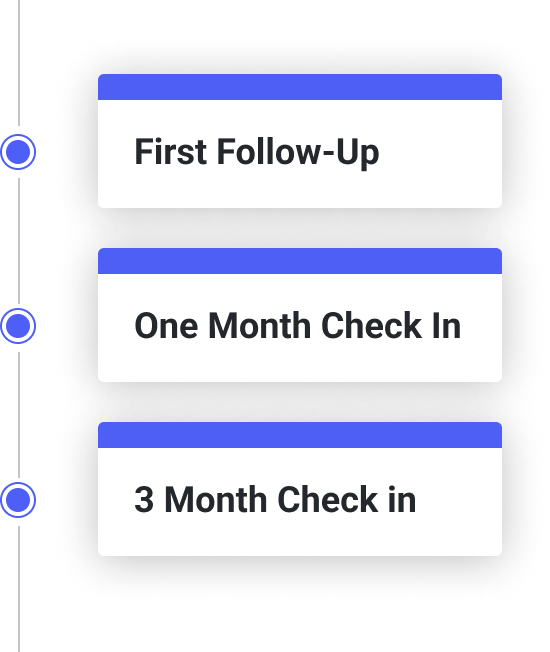
Recruiters intrinsically understand the importance of efficient and personalized communication. They must actively remain in touch with candidates in the midst of interview processes alongside potential candidates who are not quite ready to change positions. In fact, 70% of the global workforce is comprised of passive talent who are not actively job searching. Recruiters must sustain streamlined processes to track conversations and respond in a timely manner to both candidates and clients.
Perhaps unsurprisingly, text messages have 18 times the response rate of emails with a much higher probability of the applicant responding to the message (Retail Dive). A 2019 research study by the North American Candidate Experience found that candidates who received text messages during the recruitment process rated their candidate experience 50% higher than those who did not. Furthermore, when recruiters understand how to enhance the recruitment process, they can shorten the hiring cycle by 60% while improving quality. In this post, we list four key reasons staffing agencies need to implement texting in 2023 and beyond.

Lead Nurturing
It is critical for staffing agencies to keep in touch with promising candidates even if they are not actively seeking a new role. According to ERE Media, top candidates only stay on the market for an average of ten days. Timing is everything, and respectful persistence increases the odds that candidates will reach out while researching new opportunities. Also, text messages maintain a 90% open rate and are often read within the first three minutes. While people open the vast majority of incoming text messages, 72% of consumers say that they only engage with personalized messaging. It is accordingly essential for recruiters to tailor content to the individual.
Sonar helps staffing agencies individualize conversations by segmenting automated messages based on specific conditions, triggers, and actions. When recruiters specify and organize contact lists, their messages become increasingly relevant to the recipient. For example, a recruiter might schedule text messages for passive candidates in a particular industry. This kind of automation fosters efficiency, increases the likelihood of prolonged and meaningful engagement, and helps recruiters develop personalized relationships with candidates and clients.

Scheduling
Most professionals anecdotally understand the difficulty of scheduling. However, for staffing agencies, inconvenient scheduling processes can mean losing excellent candidates. With email becoming decreasingly convenient (just read this New Yorker article titled “E-mail Is Making Us Miserable”), texting has become increasingly popular for business use. Texting is also better for time sensitive matters such as confirming availability and interview times. E-mail, however, is better suited to long form information that can be accessed at a later time.
With texting, candidates can easily share their availability and select times for interviews and appointments, and recruiters can seamlessly share their existing calendar. Sonar, for example, has an integration with Calendly, a service that allows professionals to schedule meetings with clients. Sonar integrates with Calendly so that an icon is visible by the message input (see image below). Clicking on that icon will bring up all of your calendars that you can then select and share with your candidates.

Reminders and Follow-Ups
Candidates often apply to multiple positions simultaneously while working with a recruiter. According to Indeed, candidates are recommended to apply to two to three jobs online daily. It is easy for job seekers to lose track of their applications amidst varying interview processes. In addition to working with a staffing agency, many candidates continue to apply to positions on their own. Texting provides an uncomplicated way for recruiters to send reminders about current opportunities, links to forms, and updates regarding candidate status.
The convenience of texting helps candidates to stay informed and trust their recruiter during the job search. In a recent report by PWC, 49% of respondents declined a job offer because of a disappointing recruitment experience. Conversely, 89% of talent say that being contacted by their recruiter can make them accept a job faster. Consistent messaging is not just a perk; it’s necessary in order to cultivate long-lasting and loyal customer relationships.

Client and Candidate Feedback
One of the most important ways recruiters can nurture leads is by simply requesting feedback. Once a candidate has found a job or a client has sourced their new hire, the recruiter must proactively ask for an honest assessment of the process. Lever reported that 78% of job seekers have never been asked for feedback on their candidate experience. Requesting feedback makes people feel truly valued and involved. It also helps agencies improve their existing systems and processes using data rather than unscientific hunches. Texting makes it as simple as replying “1” to a message to gather feedback, and the information empowers recruiters to hone their skills.

Conclusion
It is critical for staffing agencies to communicate in an efficient and personalized manner with both candidates and clients. Texting helps professionals to easily stay in touch with leads, send reminders, schedule meetings, and request feedback. With most candidates juggling multiple job applications, texting helps job seekers to remain organized and form a trusting relationship with their recruiter. The average person holds 12 jobs in their lifetime, so recruiters must view candidate placement as one step within a bigger journey of career development. If you are looking to implement texting at your staffing agency, schedule a demo of Sonar today.